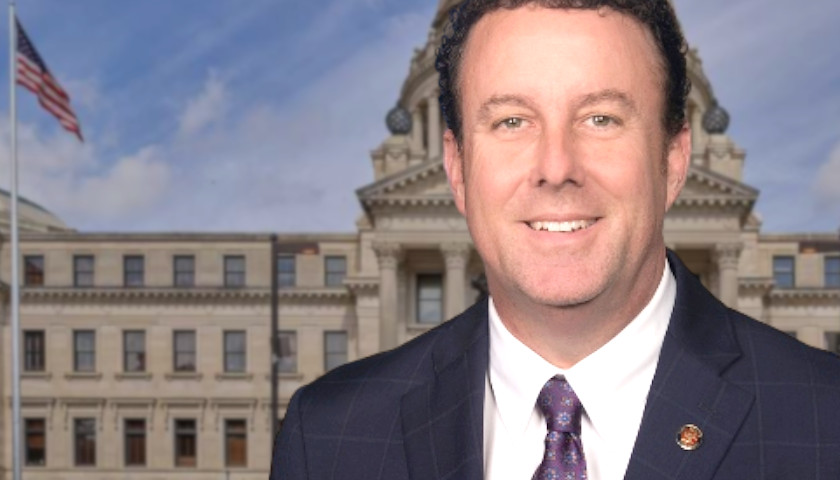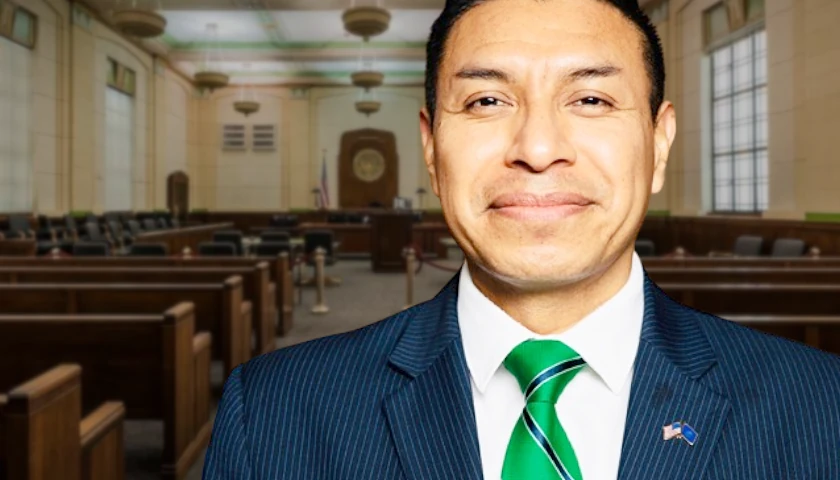During his presentations of a bill that would enter the state of Mississippi into an interstate compact with Arkansas and Tennessee, the state Senate sponsor completely omitted that, if passed, the law would create an unelected quasi-governmental entity with very broad powers, including eminent domain. The bill went on to pass the state Senate unanimously on February 3.
SB2716, sponsored by Republican State Senator David Parker (R-DeSoto), is a 17-page document that creates the RegionSmart Development District (District) and the RegionSmart Development Agency of the Greater Memphis Region (RegionSmart Development).
The district will include the seven non-contiguous Tennessee counties of Shelby, Fayette and Tipton; Arkansas counties of Crittenden, Craighead and Mississippi; and the Mississippi county of DeSoto.
RegionSmart Development shall be governed by a 15-member unelected commission that resides in the district, and consist of five members from each state appointed by the mayors of the respective cities or counties within the district who will serve staggered three-year terms.
Other than an introductory paragraph in the Mississippi version, the legislation mirrors that of a bill that was taken up in a Tennessee House subcommittee earlier this month, The Tennessee Star reported.
The purported purpose in establishing the District and Development Agency is to improve the quality of life, promote economic development, stimulate economic growth, minimize unemployment and promote the general welfare for the benefit of the citizens of Arkansas, Mississippi and Tennessee, according to the bill.
What was left out of the presentations by both the Tennessee and Mississippi sponsors of their respective bills is that the commission will operate virtually autonomously and have very broad powers that include, but are not limited to:
– employment of individuals in capacities appropriate to fulfilling the mission, including a president or other executive officer
– contracting with individuals as well as governmental and non-governmental entities to provide services to each other and to RegionSmart Development
– applying for grants and funding from governmental and non-governmental sources
– owning and operating facilities as well as charging and collecting fees for use of those facilities
– receiving funds from governmental or non-governmental entities, including the federal government
– disbursing funds
– making plans for streets, highways, parkways, parking areas, terminals, water supply, sewage, disposal works, recreational and conservation facilities, land-use pattern and development of the district
– petitioning any number of commissions or governmental authorities having jurisdiction in the premises and intervening in any proceeding affecting the commerce of the district
– the disposal or acquisition, planning, construction, operation and maintenance of roads, airports, wharves, docks, harbors and industrial parks adjacent to and necessary and convenient to critical infrastructure and disposal of refuse or waste
– issue bonds and borrow money
– eminent domain and condemnation over any and all rights or property, of any kind or character
– own and operate facilities and collect revenues for the use of the facilities
– develop and implement marketing and communication strategies
The commission would be required to:
– inform themselves of matters necessary to fulfill their duties and attend meetings
– be subject to conflicts-of-interest policies
– not take action unless three commissioners from each state are present and majority from each state vote in favor of the action
– exercising the powers of eminent domain or condemnation of property must be by unanimous vote of the commissioners in the state of the subject property
– adopt bylaws as well as policies related to open records, employment and procurement
The legislation literally recognizes that with the compact, the states are creating a “quasi-governmental and public entity.”
And, while the legislation directs that “RegionSmart Development be conducted in a transparent and inclusive manner,” and that the commissioners “shall adopt … an open-records or ‘sunshine’ policy,” there are concerns that the records would not be subject to Tennessee’s public records or open meeting laws.
This, according to a post by Tennessee Coalition for Open Government’s Executive Director Deborah Fisher, who consulted with Lee Pope, the Open Records Counsel for the state of Tennessee.
Parker, who chairs the Economic and Workforce Development Committee, where the bill also passed unanimously, gave much the same presentation on his proposed legislation there on January 26 as he did on the Senate floor about a week later.
Parker, who represents DeSoto, the one Mississippi County that would be entered into the compact, told his fellow senators that the federal government has been encouraging collaboration.
“With the passage of the Infrastructure Investment and Jobs Act, there was an advanced congressional consent for interstate compacts involved in advocating for freight corridors and improving mobility of goods that have been impacted by the supply chain. In addition, there was established a new grant fund reserved solely for interstate compact agencies engaged in such purposes.”
On November 15, 2021, the $1.2 trillion the bipartisan Infrastructure Investment and Jobs Act became law.
The Bipartisan Policy Center, which compiled a table of major competitive grants included in the law to explain the grants, indicates that $25 million is available from USDOT to states with existing or intended multi-state compacts for the purposes of multi-state freight corridor planning. The federal share is 50 percent for existing compacts and goes up to 75 percent for new compacts. The funding is subject to annual appropriations of $2 million for new compacts.
Other grant funding from USDOT in the amount of $15 million is available for interstate rail compacts, although it is not clear from the legislation if the RegionSmart interstate compact would qualify for this grant for the planning, administration and operations of interstate rail compacts.
Parker went on to invoke the nation’s founding documents to justify his legislation, citing the constitutional provision on the powers prohibited by the states that Congress is enabled to waive.
“What this bill would do would be create an interstate compact pursuant to Article 1, Section 10 of the U.S. Constitution for the first time and allow the entire region to work as a regional organization to pursue economic development opportunities and projects,” Parker said.
“In that area – the mid-south region – we have the largest cargo airport in the entire world in Memphis. We have a great logistical kind of crossroads including major interstates, railways and, of course, we have the river there, too. And what this would do is it would allow this unified group to seize on some opportunities in this manner.”
Parker mentioned the closure of the I-40 bridge over the Mississippi for about three months during the middle of 2021 due to cracks, impacting commerce and the supply chain.
During his presentation of the bill to his committee, Parker said that the event drove the area mayors to make a concerted effort to try to find a way to work together to improve the infrastructure and just how things flow through. As such, “They had some really exciting potential plans they would like to consider,” said Parker.
On the Senate floor, Parker said he got permission over the weekend to say publicly that one of the purposes of the legislation is to pursue the possibility of an additional bridge in the DeSoto County region that would cross the Mississippi River. Parker expressed hopefulness that it “would allow an increase … not just to our county, but more access into the delta and other things that I think would be great for our state.”
Parker told his fellow senators both in committee and on the Senate floor, that the district would not have any power of taxation and that no proposal could be ratified by the commission unless the majority of each state’s delegation voted in favor of the measure. “This essentially gives each state veto power,” Parker said.
What Parker and Tennessee Representative Kevin Vaughan (R-Collierville) obviously left out of their explanation of their respective bills, among a number of other critical aspects previously mentioned, is that the commission does have the power to charge and collect fees, which can be political semantics when excess fees become an additional source of government revenue or when the fees are insufficient to cover the specific projects costs and have to be subsidized with tax dollars.
Once Parker’s bill passed unanimously, State Senator Kevin Blackwell (R-Marshall) and State Senator Michael McLendon (R-DeSoto) signed on as co-authors of Parker’s bill.
No action on the legislation is currently scheduled in the Mississippi State House, according to the legislature’s website.
The legislation states that it will go into effect when two of the three states enact the law.
In Arkansas, during even-numbered years the General Assembly convenes only in a fiscal session, which is limited to 30 days, but could be extended one time not to exceed an additional 15 days by a three-fourths vote of the members, according to House documentation.
However, a two-page Senate Concurrent Resolution SCR1 was introduced on February 15 with Senator Keith Ingram (D-District 24-West Memphis) as the lead sponsor and Senator David Wallace (R-District 22-Leachville) as a co-sponsor and Representative Joe Jett (R-District 56-Success) as the House sponsor along with co-sponsor Representative Deborah Ferguson (D-District 51-West Memphis).
No upcoming events are currently scheduled for Arkansas’ SCR1, according to the General Assembly website.
In Tennessee, while HB1989 passed out of the House Business & Utilities Subcommittee February 16, action by the full House Commerce Committee has been deferred until March 8. The Senate companion bill, SB1915, was deferred once by the Senate Government Operations Committee, but is scheduled on the calendar for March 2.
– – –
Laura Baigert is a senior reporter at The Star News Network, where she covers stories for The Tennessee Star and The Georgia Star News.







A SMART CITY isn’t what you think it is. S.M.A.R.T. is an acronym. It is a means for the global deletes to herd you into a location where you are controlled like cattle.
S – Surveillance
M – Monitoring
A – Analysis
R – Reporting
T – Technology
This is a BAD bill and gives UNelected people power of eminent domain?
Shame on the senate for passing this. The american people once again will lose.
Exactly!!
Anytime you see the word SMART, you can bet it’s all about how they can push the NWO and take away more from the average citizen.
If/when the federal government takes control of that area around the airport and Mississippi river ports, they will be able to choke off a very large portion of goods and supplies coming into the southeast region of the country. They will also be able to take some very fertile crop land away- further plunging the region into poverty.
This is a very bad deal, but the citizens of those counties are the ones who will have to stop it. The “program” will probably expand like a cancer if they get a toe hold.
This is JUST what Tennessee and Memphis does NOT need, MORE “RegionSmart Development!”
“What was left out of the presentations by both the Tennessee and Mississippi sponsors of their respective bills is that the commission will operate virtually autonomousl.” Does anybody else find it interesing that these WONDERFUL, AMAZING opportuniities always have to skirt around regular government oversight, and operate in the “shadows?”
Just say NO!
Agree
“With the passage of the Infrastructure Investment and Jobs Act, there was an advanced congressional consent for interstate compacts involved in advocating for freight corridors and improving mobility of goods that have been impacted by the supply chain. In addition, there was established a new grant fund reserved solely for interstate compact agencies engaged in such purposes.”
So all the Fed government has to do is flash some cash and county and state officials will sell out their citizens in a heartbeat! People better wake up and fast! If the Fed Government is pushing for regional governments it cant be good! There’s much too be concerned about in this legislation including the CRT principles that Region Smart promotes. And a quick read will also tell you that this is an Agenda 21 project if you know anything about that. This legislation in Tennessee needs to die!
Mr. Vance refers to the United Nations’ Agenda 21 project. What is the Agenda 21 project? I have no doubt that Memphis’ U. S. Rep. Steve Cohen loves it. Briefly it is the following:
UN Agenda 21/Sustainable Development is the action plan implemented worldwide to inventory and control all land, all water, all minerals, all plants, all animals, all construction, all means of production, all energy, all education, all information, and all human beings in the world. It is about INVENTORY AND CONTROL.
In a nutshell, the plan calls for governments to take control of all land use and not leave any of the decision making in the hands of private property owners. It is assumed that people are not good stewards of their land, and the government will do a better job if they are in control. Individual rights in general are to give way to the needs of communities as determined by the governing body. Moreover, people should be rounded up off the land and packed into human settlements, or islands of human habitation, close to employment centers and transportation. Another program, called the Wildlands Project spells out how most of the land is to be set aside for non-humans.
U.N. Agenda 21 cites the affluence of Americans as being a major problem which needs to be corrected. It calls for lowering the standard of living for Americans so that the people in poorer countries will have more, a redistribution of wealth. Although people around the world aspire to achieve the levels of prosperity we have in our country, and will risk their lives to get here, Americans are cast in a very negative light and need to be taken down to a condition closer to average in the world. Only then, they say, will there be social justice which is a cornerstone of the U.N. Agenda 21 plan.
Tennessee General Assembly, are you still FOR this Interstate Compact? Don’t take my word for it. Check it out for yourself.
This is a dangerous bill. Why isn’t it getting more coverage? The people in these counties have to object and why aren’t they??
[…] The Tennessee Star […]